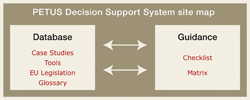Sustainable cities
The vast majority of Europe's citizens live in cities. Encouraging cities to grow in accordance with the principles of sustainable development will ensure a high quality of life for their inhabitants. In light of this need, the Key Action of the EESD Programme entitled 'City of Tomorrow' funded the PETUS project to provide relevant tools to decision makers. Work by the Austrian institute Joanneum Research focused on creating a matrix and checklist that guide users through the decision making process. The concept of a decision making framework was formed following analysis of case studies, workshops and interviews with the various stakeholders, including politicians, technocrats, administrative officials and the general public. In trying to find the right balance between their sometimes conflicting needs, an emphasis was put on information sharing, communication and interaction between the stakeholders in general. The first decision support tool, the matrix, serves to prompt its users with questions at various stages of the project or plan under consideration. It is intended for use by all the aforementioned stakeholders. The second tool, the checklist, is a list of critical questions that must be asked when designing sustainability into a new project. All environmental aspects, such as energy, air, waste, water, flora and fauna, are addressed. It should be mentioned that the new tools are compatible with the Strategic Environmental Assessment (Directive 2001/42/EC). The information gathered when using the matrix and checklist can form the basis of a Strategic Environmental Assessment if one is deemed necessary. "Fig.: the layout of the PETUS decision support system - www.petus.eu.com"





